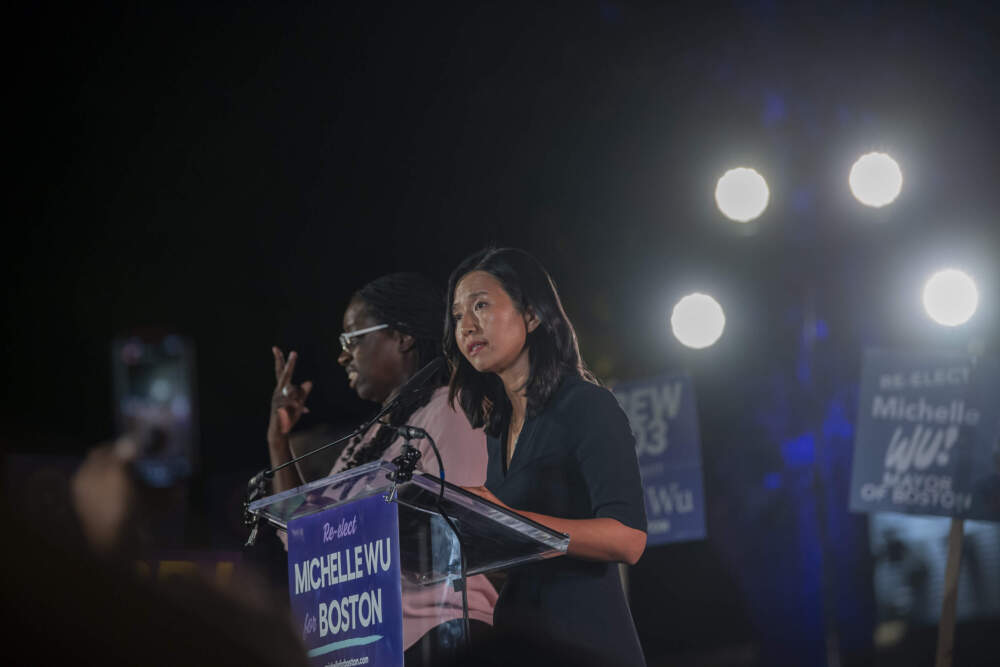Editor’s Note: This is an excerpt from WBUR’s politics newsletter, Mass. Politics. If you like what you read and want it in your inbox, sign up here.
Mayor Michelle Wu is now officially unopposed in this fall’s election. But beyond November, she faces perhaps an even greater challenge: the wrath of the White House.
Over the last eight months, Boston and Wu have become prime targets of the Trump administration. Federal officials accuse the city of providing safe harbor to violent criminals by refusing to cooperate more on immigration enforcement, and have flooded communities throughout the region with ICE agents.
As we recently reported, that’s caused local officials to fret over the possibility of troops on Boston streets. Trump recently sent the National Guard to patrol major Democrat-led cities like Washington, D.C., and Los Angeles, and is planning deployments for Memphis and Portland. Boston — which despite some problem areas boasts historically low crime rates — hasn’t been named publicly among the growing list of cities that Trump has threatened with deployments. Still, Wu and Massachusetts Attorney General Andrea Campbell have indicated they’re bracing for the possibility. (Neither has detailed what those preparations entail.)
So far, much of the conflict between the city and federal government has been less visible than troops on the streets. Boston has faced an antisemitism inquiry and a lawsuit over immigration from the Justice Department. Last week, Wu told the Greater Boston Chamber of Commerce the city relies annually on some $300 million in federal funding, primarily for education, public safety and housing. And she said an array of those dollars are at risk, including grants awarded under the Biden administration that have been revoked or threatened with cancellation.
“Some of this, they may have the right to do — some of this they legally cannot do at the federal level,” Wu told the assembled business leaders. ”And so, unfortunately, we have also been very busy in court.”
Campbell is convening weekly meetings with local officials about funding cuts to municipalities. Wu said the meetings are intended “to make sure we’re on the same page about which grants are now on the chopping block, or which ones we should or shouldn’t apply for.” She said that also includes certain types of language to avoid in grant applications.
Wu cited one victory: Through a court decision, Boston was able to retain access to roughly $48 million in funding to address homelessness. On the other hand, the mayor cited grants for neighborhood-level infrastructure projects that appear to be lost, such as $20 million for road improvements in Roxbury.
Wu reiterated something she’s said since before Trump took office: Boston won’t back down from being a welcoming city. She says it’s actually a competitive advantage the city should continue to embrace.
”Up against federal threats, rising tides and chaotic markets, Boston is and will be the best place to build a business, because we are making Boston the best place for families of every culture and every generation,” Wu said.
While any battle between the federal government and the country’s 25th largest city is hardly a balanced fight, Wu has seen her national profile rise as a critic of the Trump administration. Her emergence as David to Trump’s Goliath doesn’t please everybody — for example, the handful of labor unions that endorsed her former opponent Josh Kraft for mayor. Asked why they backed the underdog, one union official recently told me Wu was too busy “fighting the guy in Washington,” and not concerned enough with development in the city.
However, Wu said at the Chamber event that the results of the preliminary earlier this month show that the majority of the city’s residents are backing her up.

